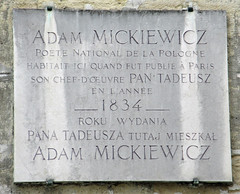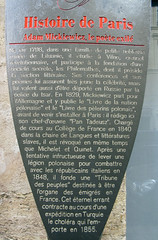Commemorated on 2 plaques
Adam Mickiewicz, Poète national de la Pologne, habitait ici quand fut publié à Paris son chef-d'oeuvre Pan Tadeusz en l'année 1834. Roku wydania Pana Tadeusza tutaj mieszkal Adam Mickiewicz.
English translation: Adam Mickiewicz, Polish National Poet, lived here when his masterpiece Pan Tadeusz was published in Paris in 1834. Roku wydania Pana Tadeusza tutaj mieszkal Adam Mickiewicz. [AWS Translate]
63 rue de Seine, Paris, France where they was
Adam Mickiewicz, le poète exilé. Né en 1798, dans une famille de petite noblesse ruinée de Lituanie, il étude à Vilno, creuset révolutionnaire, et participe à la fondation d'une société secrète, les Philomathes, dont il préside la section littéraire. Ses conférences et ses poèmes lui assurent très jeune la célébrité, mais lui valent aussi d'être déporté en Russie par la police du tsar. En 1829, Mickiewicz part pour l'Allemagne et y publie le "Livre de la nation polonaise" et le "Livre des pèlerins polonais", avant de venir s'installer à Paris: il rédige ici son chef-d'oeuvre 'Pan Tadeusz'. Chargé de cours au Collège de France en 1840 dans la chaire de Langues et littératures slaves, il est révoqué en même temps que Michelet et Quinet. Après une tentative infructueuse de lever une légion polonaise pour combattre avec les républicains italiens en 1848, il fonde une "Tribune des peuples" destinée à être l'organe des émigrés en France. Cet éternel errant contracte au cours d'une expédition en Turquie le choléra qui l'emporte en 1855.
English translation: Adam Mickiewicz, the exiled poet. Born in 1798, in a family of ruined little nobility of Lithuania, he studied in Vilno, a revolutionary crucible, and helped to establish a secret society, the Philomathes, of which he presided over the literary section. His lectures and poems gave him fame at a very young age, but he was also deported to Russia by the Tsar police. In 1829 Mickiewicz left for Germany and published the “Book of the Polish Nation” and the “Book of Polish Pilgrims” there, before moving to Paris: here he wrote his masterpiece 'Pan Tadeusz'. Lecturer at the Collège de France in 1840 in the Chair of Slavic Languages and Literatures, he was dismissed at the same time as Michelet and Quinet. After an unsuccessful attempt to raise a Polish legion to fight with the Italian republicans in 1848, he founded a “Tribune des peuples” to be the organ of emigrants in France. This eternal wanderer contracted cholera during an expedition to Turkey, which prevailed in 1855. [AWS Translate]
15 rue de Seine, Paris, France where they was


